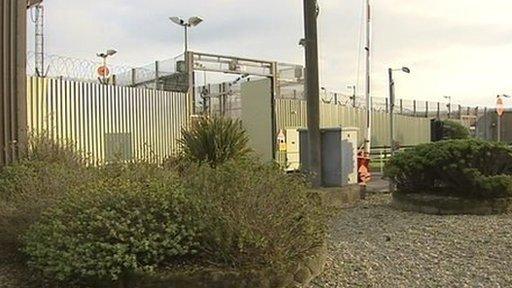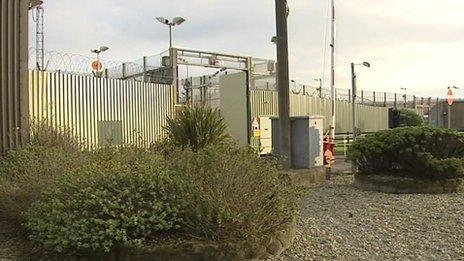Magilligan Prison: Performance slips since last CJI inspection in 2010
- Published

The Criminal Justice Inspection Northern Ireland (CJI) report found the prison's strengths could be undermined by a number of factors
A report into Magilligan Prison has found its performance has slipped since it was last inspected in 2010.
The Criminal Justice Inspection Northern Ireland (CJI) report, external found the prison's strengths could be undermined by a number of factors.
These included a risk adverse culture and an unwillingness to challenge poor behaviour.
Justice Minister David Ford acknowledged that further work was required in some areas.
The inspection found that good relationships between staff and prisoners existed and there were reasonable levels of safety at the prison.
The CJI also said that "real progress" had been made in terms of resettlement practice which had been assessed as good by inspectors.
The inspection was carried out by CJI and Her Majesty's Inspectorate of Prisons in England and Wales (HMIP), with support from the Regulation and Quality Improvement Authority (RQIA) and the Education and Training Inspectorate (ETI).
Brendan McGuigan, chief inspector of Criminal Justice in Northern Ireland said: "Since our last inspection of Magilligan Prison in March/April 2010, there has been clear progress in some areas.
'Seamless transition'
"Relationships between staff and prisoners were much better than elsewhere in Northern Ireland and we noted many good interactions between staff and prisoners.
"Despite some gaps in the resettlement strategy, prisoners had good access to a broad range of resettlement services which is crucial to ensure seamless transition into the community.
"The inspection also noted some excellent, joined-up offender management driven by both prison and probation staff."
Nick Hardwick, Her Majesty's chief inspector of prisons in England and Wales said: "The atmosphere throughout the prison was relaxed and calm. Free flow movement was well managed and staff supervision on house blocks was effective.
"Inspectors also found evidence that mental health services had improved within the prison. Interventions to tackle substance misuse were comprehensive and appropriate, although waiting lists were long."
'Complacency'
However the chief inspectors were concerned by some of the inspection findings and called for improvements to be made.
"This inspection found a degree of complacency about safety within the prison and a culture that was risk averse. This sometimes manifested itself in an unwillingness to challenge poor behaviour.
"For example, levels of drug use were high and there were no disciplinary consequences for a positive drug test result.

David Ford said he welcomed that the prison had achieved the highest possible mark for prisoner resettlement
"The level of purposeful activity was also poor and at the time of the inspection, nearly half of the prison population were not participating in education, vocational training or work activities."
Mr Hardwick said: "While there was reasonable time out of cells for prisoners, it was unfortunate so many were not engaged in challenging work or participating in good quality education and training which would enhance their employability skills on release."
The chief inspector of Criminal Justice said more effective rehabilitation at the County Londonderry prison could be provided for prisoners.
"Rehabilitation is not easy and does not happen overnight," he said.
'Innovative solutions'
"It needs prisoners to be challenged, to confront their offending behaviours, to gain skills that will help them find employment and stability on their release, so they break from the cycle of criminality.
"To provide effective rehabilitation in Magilligan, the Northern Ireland Prison Service needs to drive forward innovative solutions such as the development of social enterprise opportunities and ensure those delivering services in education and training are providing effective and relevant programmes.
"The Prison Service cannot of course achieve effective rehabilitation in isolation, and there are opportunities for local employers and education and skills providers to assist."
Responding to the report, Justice Minister David Ford said he welcomed that the prison had achieved the highest possible mark for prisoner resettlement.
"Magilligan Prison has achieved positive outcomes in three of the four healthy prison tests and the inspectors highlighted staff prisoner relationships, levels of safety, and resettlement as areas where good work is being delivered," he said.
"The report also highlights where further progress is needed, in particular on purposeful activity.
"The Prison Service is already taking steps to address this issue by working with education professionals from North West College to deliver real outcomes for people in custody."
'Significant milestone'
Director general of the Prison Service, Sue McAllister, said the report reflected the "significant progress" that had been made at Magilligan.
"While I acknowledge the comments made by the inspection team in respect of purposeful activity, it is important that we do not lose sight of the overall progress in the prison," she said.
"Receiving the highest mark for resettlement is a significant milestone for the Prison Service, the first time we have received this assessment. Resettling prisoners back into the community is a critical part of our work to build a safer Northern Ireland.
"It is also well recognised that the buildings and facilities at Magilligan require significant improvement.
"The proposed new build at Magilligan will help to address the issues highlighted by the inspectors. In the interim the experienced senior team and the staff at Magilligan will continue to build on the progress and will address the recommendations in the report."
- Published23 April 2012

- Published13 September 2010